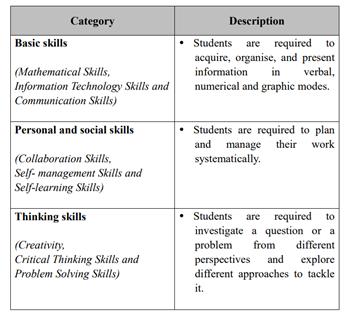Home
Essential Qualities of Project Learning
- PL, which is enquiry in nature, is a powerful learning strategy to promote self-directed, active and self-reflective learning. It can be contextualised within and across KLAs and beyond.
- PL usually starts with an enquiry question or a problem, and involves students in working together or individually to plan, read, gather information and make conclusions and/or recommendations over a period of time. Emphasis should be placed on both the learning process and the product which are equally important.
- PL activities often involve the other three Key Tasks, particularly Reading to Learn: Towards Reading across the Curriculum and Information Technology (IT) for Interactive Learning: Towards Selfdirected Learning. Through engaging in various activities for acquiring new information and skills, students practise self-directed learning in order to learn more about the topic and at the same time explore and develop moral and civic values and positive attitudes.
- Bridging student learning at various interfaces is a key consideration in the design of PL. Building upon students’ prior experiences at the primary level, PL at the junior secondary (JS) level prepares students for further enquiry studies at the senior secondary (SS) level, e.g. in preparing students for the Independent Enquiry Study (IES) in Liberal Studies.
Mission
PL is a good vehicle for fostering students’ development of all the nine generic skills, i.e. collaboration skills, communication skills, creativity, critical thinking skills, information technology skills, mathematical skills, problem solving skills, self-learning skills and self-management skills. The nine generic skills can be broadly represented in three categories and are related to PL as follows:

Source: Secondary Education Curriculum Guide (2017)
School-Based Theme
S1 |
Quality of life in Hong Kong |
S2 |
Life and culture in Hong Kong |
S3 |
STEM X Project Learning |